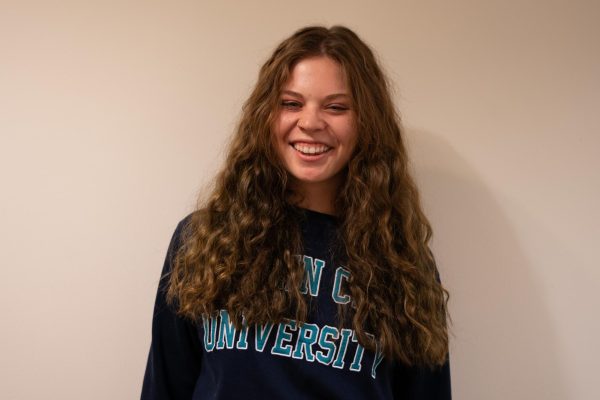Court records reveal College sued for discrimination in Title IX
The Iowa State Capitol building.
March 6, 2023
Two lawsuits, one dismissed and the other settled out of court, describe details in Grinnell College Title IX proceedings which a federal court has found could make the College liable for sex discrimination and violations of its own sexual misconduct policy. A third lawsuit against the College, on the same counts, was dismissed prior to a court ruling on the evidence.
The lawsuits were each terminated in 2019, 2020 and 2021 respectively. After 2015, the College’s Title IX office shifted from using hearing boards in adjudicating sexual misconduct complaints to using an external adjudicator, a role frequently filled by Marsha Ternus, former chief of the Iowa Supreme Court, according to court documents. The office also began engaging Kansas City-based Husch Blackwell, LLP, for conducting investigations the same year.
After a formal investigation is initiated by the Title IX office, an external investigator is tasked with gathering all evidence relating to the allegation into a final investigation report, which the investigator submits to an external adjudicator that is unaffiliated with the College. Then, the adjudicator determines if an individual is likely responsible for sexual misconduct using the preponderance of evidence standard — a standard needing a lower threshold of evidence than innocent-before-guilty standards in criminal court.
The changes arose amidst advocacy by the student-group Dissenting Voices, a group urging reform of the College’s Title IX process. According to a 2015 Huffington Post article addressing sexual assault at the College, the process sometimes resulted in penalties some students called “a joke.”
John Doe v. Grinnell College
On March 2, 2017, a former student under the pseudonym John Doe filed a complaint in the Southern Iowa U.S. District Court against Grinnell College alleging that the College violated Title IX by engaging in sex discrimination against him and breaching the terms of its sexual misconduct policy.
Doe was dismissed from the College in 2016 following two separate accusations of sexual misconduct from female complainants. Doe’s 2017 appeal to the College was denied.
After over two years of case proceedings, the court found in July 2019 that Doe produced evidence sufficient for a reasonable jury to find the College liable on both counts. The case proceeded to a jury trial set for March 3, 2019.
According to the July order, the court found the potential for gender bias from the fact that Ternus wrote in the final adjudication that because the second complainant ran out of birth control, there exists more support for the complainant’s assertion that she did not want to have sex.
According to the same document, the court also found that Ternus did not consider, analyze or note statements made by the complainant to investigators that while with Doe, she “should have just stopped and left … but I turned back towards him and I — I responded — I like kissed him.”According to the document, Ternus also did not address in the adjudication a comment the complainant made that she had made requests to Doe that he could “be more rough” with her, which the court found to be evidence for sex discrimination against Doe.
The court found the fact that the second complainant was allowed two support persons during her investigatory interview while Doe was told he could have only one to be sufficient evidence for Doe’s allegation that the College violated its sexual misconduct policy.
The court also found credibility in Doe’s evidence as the initial Notice of Investigation he received informing him of the investigation did not accurately state the conduct he was being investigated for.
Doe and the College settled out of court on Aug. 16, 2019. The amount has not been disclosed.
Peter Moe v. Grinnell College
On Feb. 19, 2020, a second plaintiff under the pseudonym Peter Moe filed a complaint against Grinnell College alleging the College violated Title IX by engaging in sex discrimination and breaching the terms of its sexual misconduct policy, the same allegations as Doe. Moe had previously been dismissed from the College after being found responsible for three counts of sexual assault.
The court cited Ternus’ language in her adjudication as sufficient for a reasonable jury to determine sex discrimination. Ternus reasoned that because Moe had previously kissed a complainant on the cheek, he must have intended to engage in further sexual activity with her, and thus he was not credible in denying that he intended to engage in sexual activity. Ternus later wrote that Moe’s “acknowledgement that [he] may have had an erection that evening is inconsistent with [his] denial of any sexual interest in [Complainant 3].”
Moe submitted as evidence for sex discrimination details from a 2015 misconduct case adjudicated by Ternus. The case involved a female student alleging another female student of sexual assault.
In the case, Ternus said she found both female students “credible and sincere in their accounts of what happened,” but did not explain in the adjudication why she found either student credible, according to court documents. Ternus later relied, in part, on the alleged perpetrator’s credibility as reason for finding there was not enough evidence that the complainant did not consent.
The court found evidence of procedural oversights that bolster the conclusion that a reasonable jury could find the College discriminated against Moe based on sex. During the lawsuit, Moe submitted evidence that the Husch Blackwell investigator did not interview witnesses who could have corroborated Moe’s testimony, and Ternus did not have sections of the transcript in Moe’s interview with the investigator.
The court also cited evidence that the Husch Blackwell investigator received no training on the College-specific Title IX policy, despite College policy requiring investigation by “a trained investigator.”
A jury trial was set to begin Nov. 15, 2021, but the case was dismissed with prejudice on Sept. 23. The terms of the dismissal stipulate that Moe cannot file subsequent suits against the College on the same claim. No settlement notice was filed by Moe or the College to the court.
Christopher Roe v. Grinnell College
A third plaintiff with the pseudonym Christopher Roe filed a complaint on March 23, 2020, against the College alleging the same violations of Title IX and breaches of the College’s sexual misconduct policy as Doe and Moe. In April 2018, Roe was found responsible for a sexual assault that occurred over two years prior, and he was banned from campus with a 48-hour notice, according to court documents. The ban held until after the female complainant, one year below Roe, graduated.
According to Roe’s complaint, the female student had first named the alleged assailant as someone other than Roe, a fact which Roe alleges was not questioned by either the Husch Blackwell investigator or Ternus.
Roe’s complaint further alleged the Husch Blackwell investigator did not question witnesses at the request by the complainant; that Roe did not have the option to review the preliminary investigation report; and that he was not fully apprised of the allegations made against him until he met with the investigator.
Roe also submitted cases where he alleges Ternus treated female respondents more leniently than male respondents. According to the complaint, the only sexual misconduct cases Grinnell informally resolved and subsequently reopened for a formal resolution from Jan. 1, 2014 to June 30, 2018 involved male respondents. In one instance, Roe alleges that after Ternus had found a female student responsible for sexual assault, Ternus refused a request by the complainant to place a notation on the alleged assailant’s transcript because Ternus thought it would impede the student’s educational and career goals.
A jury trial was set for Nov. 15, 2021. The case was dismissed with prejudice on Aug. 10, 2020
Title IX Coordinator Bailey Asberry did not respond to a request for comment on whether the College has ended their engagement with Ternus or Husch Blackwell, but she did write in an email to the S&B that “the College engages external investigators and adjudicators appropriate to the circumstances. We do not name a specific firm or individual in the policy as who we engage may vary based on factors such as workload/availability or potential conflict of interest.”
As of March 1, 2023, Title IX coordinator training materials listed on the College’s “Title IX Information” webpage include a 2022 Husch Blackwell copyright label. Ternus and Husch Blackwell did not respond to requests for comment.
Asberry declined to answer any questions related to litigation. Asberry did not respond to a request for comment on if non-disclosure agreements or confidential clauses prevent her from speaking, but she wrote that similar to discussions of Title IX cases, discussions of lawsuits violate the The Family Educational Rights and Privacy Act (FERPA).




















































